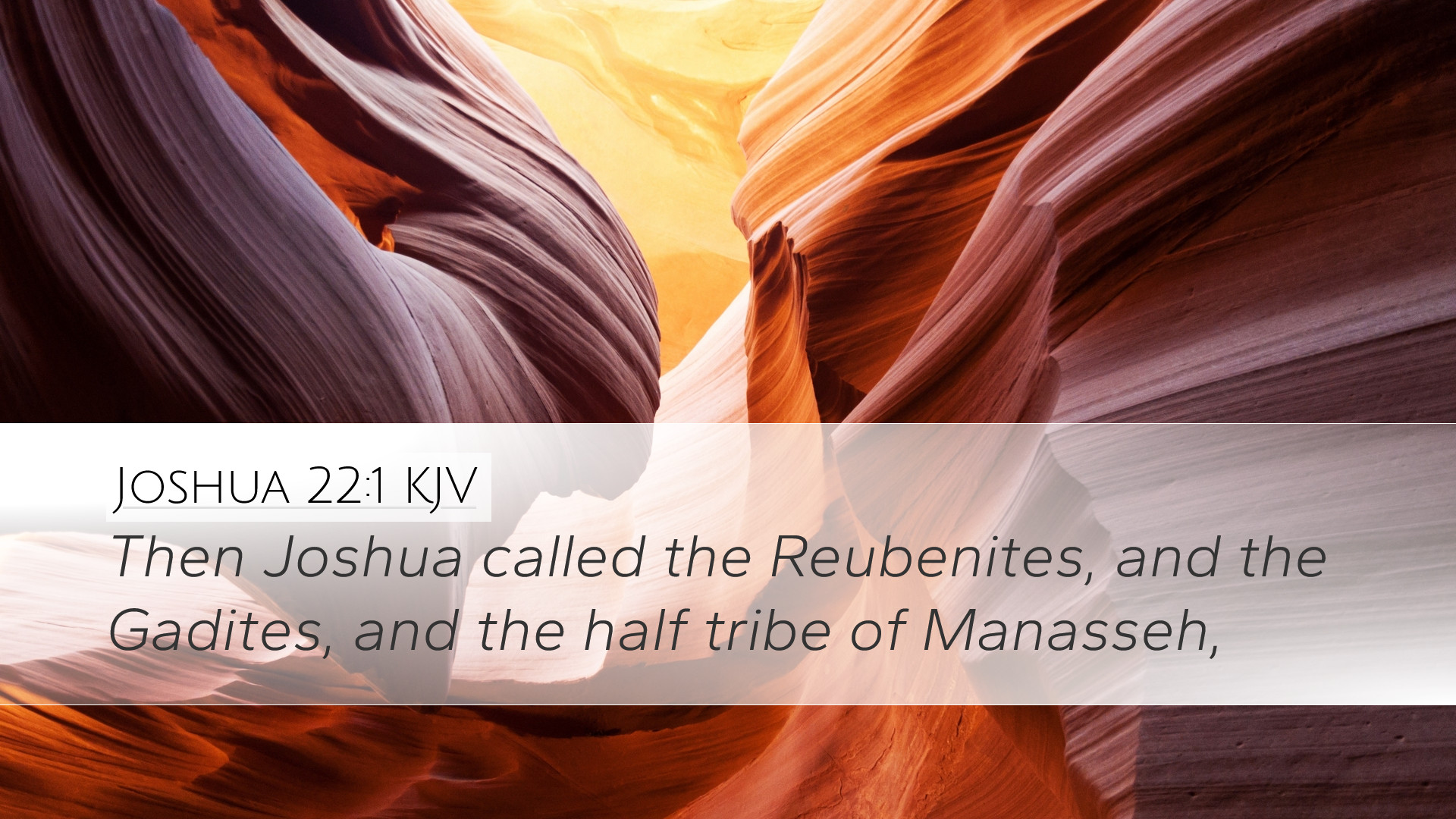Commentary on Joshua 22:1
Introduction
Joshua 22:1 marks a significant moment in the narrative of the Israelites' journey into the Promised Land. This verse captures the moment when Joshua addresses the tribes of Reuben, Gad, and the half-tribe of Manasseh, who have been instrumental in the conquest of Canaan. The verse reads:
"Then Joshua called the Reubenites, and the Gadites, and the half-tribe of Manasseh." (Joshua 22:1, NKJV)
In this commentary, we will explore insights from renowned biblical commentators such as Matthew Henry, Albert Barnes, and Adam Clarke, providing theological reflection and practical application for today's readers, pastors, students, and scholars.
Contextual Background
The background of this passage is essential for understanding its implications. The tribes of Reuben and Gad, along with the half-tribe of Manasseh, had previously requested to settle on the eastern side of the Jordan River due to its favorable grazing land for their cattle (Numbers 32). Recognizing their commitment to assist in the conquest of Canaan, Joshua and the rest of the Israelites permitted their request under specific conditions.
Insights from Matthew Henry
Matthew Henry emphasizes the role of leadership and accountability in this passage. He notes that Joshua, as a strong leader, does not shy away from addressing the Reubenites, Gadites, and Manasseh and reminds them of their obligations.
- Leadership and Communication: Henry suggests that Joshua’s call to these tribes underscores the importance of clear communication and guidance from spiritual leaders. Joshua, as an overseer, stresses the necessity of upholding promises made to God and fellow believers.
- Remembrance of God’s Faithfulness: Henry highlights that the act of calling the tribes serves as a reminder to the Israelites of God’s faithfulness throughout their journey. It reinforces the theme of divine guidance and intervention during critical moments.
- Promotion of Unity: According to Henry, the communal nature of Joshua’s call fosters unity among the tribes. It illustrates that while they occupy different lands, they remain one people under God’s covenant.
Insights from Albert Barnes
Albert Barnes provides a detailed examination of the implications of Joshua’s summons in Joshua 22:1. His observations include:
- Gratitude for Faithfulness: Barnes notes that Joshua’s address serves as an acknowledgment of the faithfulness and bravery of the western tribes who remained in the fight despite their different territorial holdings.
- Encouragement of Responsibilities: Barnes emphasizes that Joshua’s call is not merely a formality; it represents an engagement in dialogue about the responsibilities of these tribes before God and their fellow Israelites. They have aided the others in the conquest, and now they must uphold their part of the covenant.
- Understanding of Inheritance: The passage highlights the importance of understanding one's inheritance and position within the community of faith. The eastern tribes had received their inheritance, but their identity and purpose were tied to the greater mission of the Israelites.
Insights from Adam Clarke
Adam Clarke approaches this verse with a focus on the significance of obedience to God’s commands and the power of collective identity among the tribes of Israel. His insights include:
- Call to Action: Clarke expresses that Joshua’s call is a vital transition point, representing a call to action for the tribes. This emphasizes that God's purposes are fulfilled not only through individual actions but by working together to achieve communal goals.
- The Importance of Accountability: Clarke highlights that the act of calling suggests a measure of accountability for the eastern tribes. Joshua, as a leader, ensures that the tribes are held accountable for their commitments, promoting spiritual integrity within the community.
- Reflection on Legacy: The call by Joshua is seen as a moment to reflect on the legacy of faithfulness that should characterize these tribes. Clarke stresses that the tribes ought to carry this legacy forward to the succeeding generations.
Theological Reflections
In synthesizing the insights of these commentators, several theological themes emerge from Joshua 22:1 that are relevant for contemporary believers:
- Community and Identity: The importance of understanding identity within the community of faith remains relevant. Just as the tribes were reminded of their collective identity, modern believers are encouraged to see themselves as part of the global Church.
- Leadership and Responsibility: Effective leadership requires accountability and communication. Pastors and church leaders are reminded of their duty to engage with their communities actively, ensuring a cohesive spiritual journey among their congregants.
- Faithfulness and Promises: The emphasis on promises underscores the character of God and the expected behavior of His people. Believers today are called to remember their commitments to God and to one another.
Practical Applications
Pastors, students, and theologians may consider the following applications derived from Joshua 22:1:
- Encouragement of Open Dialogue: Encourage open communication within church communities regarding commitments and responsibilities, mirroring Joshua’s direct approach with the eastern tribes.
- Fostering Unity in Diversity: Develop programs or initiatives that promote unity among different congregations or denominations while acknowledging their unique contexts and missions.
- Legacy Building: Create spaces for intergenerational dialogue within congregations, allow older generations to impart wisdom and lessons learned to younger believers, fostering a sense of legacy and responsibility.
Conclusion
Joshua 22:1 serves as a crucial reminder of the collective identity of the people of Israel and the responsibilities that come with it. The insights from Matthew Henry, Albert Barnes, and Adam Clarke illuminate the importance of leadership, accountability, and the acknowledgment of God’s faithfulness through history. As modern believers reflect on these themes, they are called to foster unity, uphold their commitments, and live out the legacy of faith that is integral to their identity in Christ. Understanding these dimensions will enrich the theological depth of both personal and communal faith journeys.


